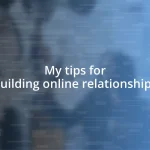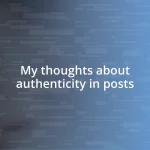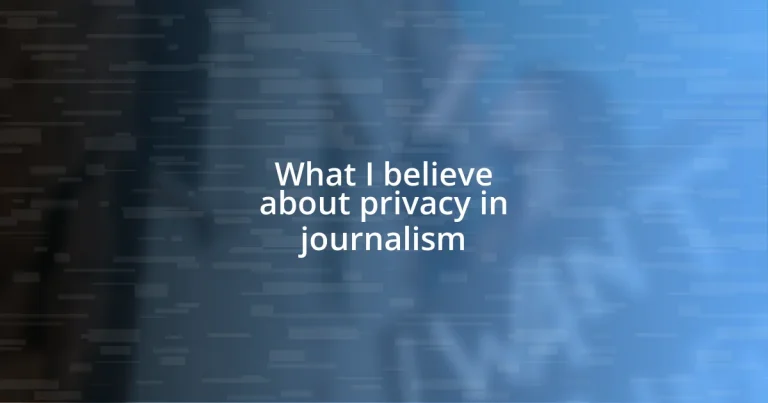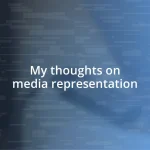Key takeaways:
- Privacy in journalism requires a balance between the public’s right to know and an individual’s right to privacy, emphasizing the need for empathy and ethical decision-making.
- Journalistic ethics, including accuracy, fairness, and sensitivity, are foundational to maintaining trust between journalists and their audience, especially in sensitive reporting.
- Future trends in journalism indicate a growing emphasis on informed consent, legal protections for sources, and the integration of privacy-preserving technologies in reporting practices.
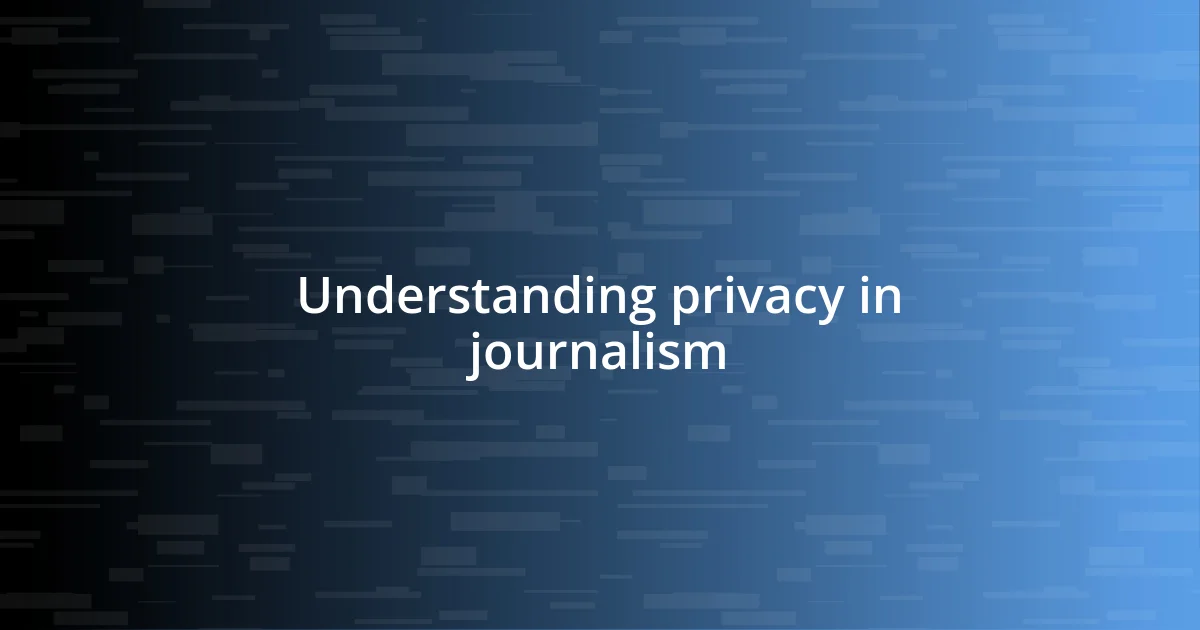
Understanding privacy in journalism
Privacy in journalism is a delicate balance between the public’s right to know and an individual’s right to solitude. I remember a story about a journalist who faced fierce backlash after publishing personal details about a public figure’s family. It made me wonder: where do we draw the line? Is sacrificing someone else’s privacy worth the story?
The ethical implications of privacy often weigh heavily on journalists. I’ve felt that tension firsthand during my reporting days when covering sensitive topics. Thoughtfully navigating these areas isn’t just about legality; it’s also about human decency. A powerful quote I once read rings true: “Just because you can report something doesn’t mean you should.” This notion keeps me grounded, reminding me of the ripple effects that my words can create.
Understanding privacy extends beyond just checking boxes or following laws. It’s about empathy and respect for individuals’ stories. I often ask myself what I would feel if I were in their shoes. These moments of reflection are crucial; they encourage a more compassionate approach to unfavorable situations in journalism, ensuring that we don’t just chase headlines but also honor the humanity behind them.
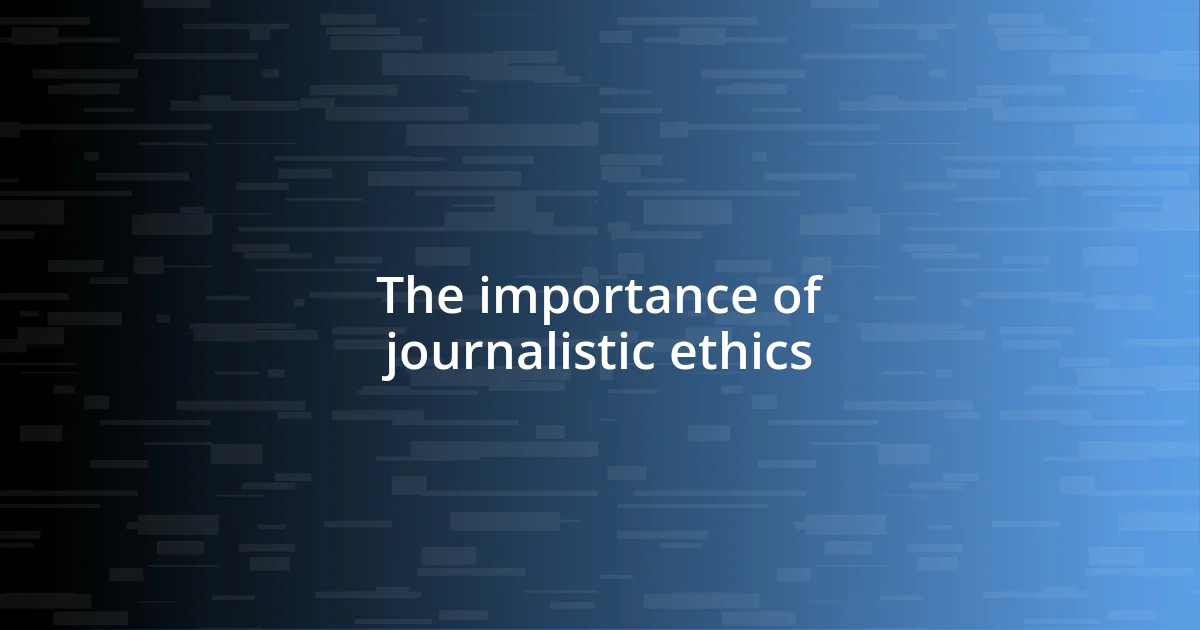
The importance of journalistic ethics
The foundation of journalistic integrity lies in ethics. I’ve witnessed firsthand how ethical lapses can derail trust between journalists and their audience. One instance that stands out in my memory involved a colleague who reported on a tragic event without considering the victims’ families’ feelings. The fallout was immense; it served as a stark reminder that ethical choices can shape or shatter public perception.
- Guiding principles:
- Accuracy: Ensuring information is truthful minimizes the risk of misinformation.
- Fairness: Balancing viewpoints helps maintain credibility and respect for multiple perspectives.
- Accountability: Taking responsibility for one’s reporting reinforces trustworthiness with the audience.
- Transparency: Being open about sources and methods fosters integrity.
- Sensitivity: Recognizing the human impact of reporting decisions encourages empathy and ethical considerations.
Maintaining these principles is crucial, as they guide journalists through the complexities of reporting. I remember a discussion in a workshop where a mentor explained that journalists are stewards of trust. This perspective shifted my approach, emphasizing that every story carries the weight of its subjects, requiring careful navigation to uphold dignity and respect.
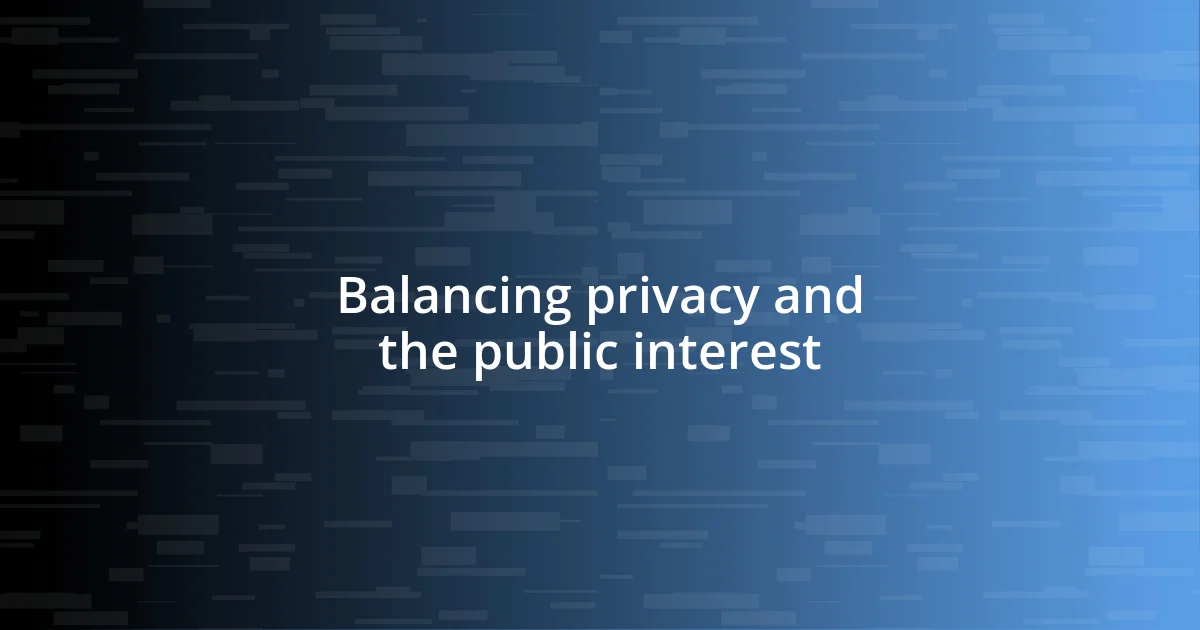
Balancing privacy and the public interest
Balancing privacy with the public’s right to know is often a tightrope walk for journalists. I recall covering a sensitive political scandal where I had to decide whether to publish damaging information about an official’s family. After much deliberation, I chose to withhold certain details, realizing that while the public deserved the story, those particulars could cause undue harm. It’s in these moments that I question whether the story is worth the potential emotional fallout.
In my experience, the crux of this balancing act lies in understanding the context and potential impact of the information I’m reporting. During an investigation into corporate misconduct, I was tempted to reveal the identities of whistleblowers. However, I realized that doing so could deter others from coming forward. This taught me that protecting individuals can sometimes serve the public interest more effectively than sensationalism. It brings to mind the idea that transparency does not mean sacrificing privacy; instead, it involves essential discernment.
Navigating this ethical landscape isn’t easy. There have been times when I felt the pressure to publish everything I knew, only to pause and think about the lives the information would touch. I remember a colleague sharing how they chose to omit identifying details of a victim in a tragic crime report because they recognized the family’s grief. That decision spoke volumes about respect and consideration. It reinforced my belief that while journalism often requires probing the depths of human experience, we must tread carefully, ensuring our work uplifts rather than undermines the individuals involved.
| Aspects | Public Interest | Privacy |
|---|---|---|
| Definition | Right of the public to know information affecting them | Individual’s right to protect personal information |
| Impact of Violations | Informed citizenry and accountability | Emotional distress and potential harm to individuals |
| Ethical Considerations | Story legitimacy and societal benefit | Empathy and respect for personal boundaries |
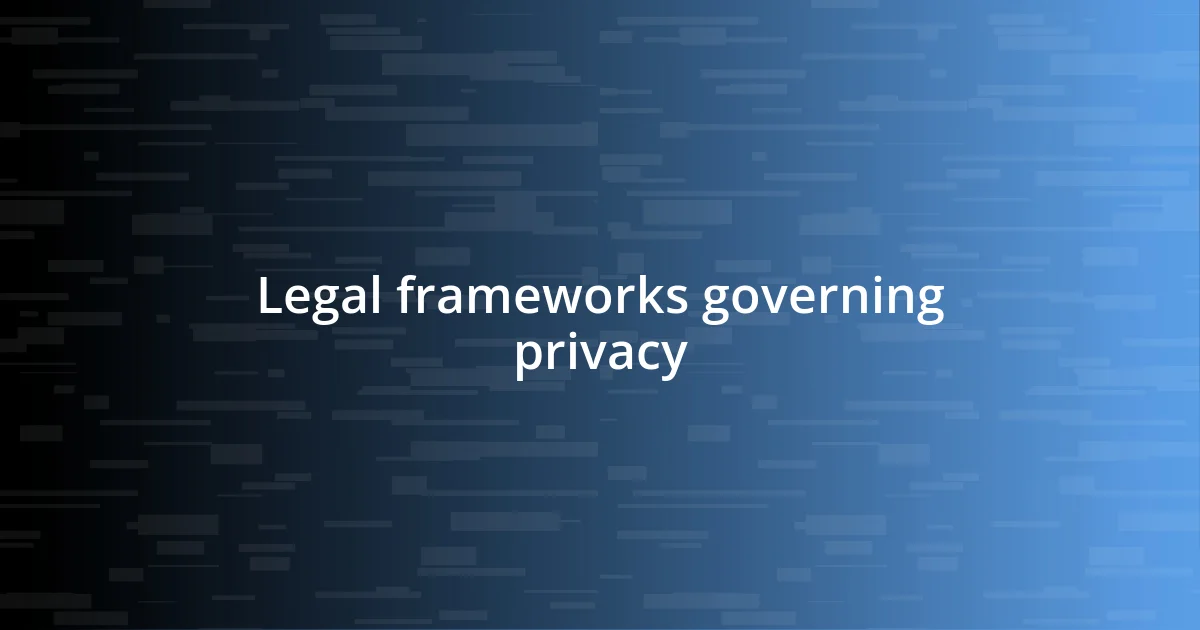
Legal frameworks governing privacy
Legal frameworks governing privacy in journalism are quite intricate and often vary significantly depending on the jurisdiction. For instance, in the United States, the First Amendment protects freedom of speech and press, which can sometimes conflict with individuals’ rights to privacy. I’ve seen firsthand how these laws can shape the narratives we choose to pursue; understanding them not only informs our decisions but also helps us gauge the potential legal repercussions of our reporting.
In many European countries, laws like the General Data Protection Regulation (GDPR) establish stringent guidelines on personal data use, fundamentally altering how journalists handle interviews and sources. I remember a time when I needed to obtain consent for using a source’s photo in an article, which was a relatively straightforward task until the GDPR came into play. It taught me to be much more diligent in respecting individuals’ privacy rights, as failure to comply could result in hefty fines and even legal action.
Moreover, ethical considerations often intertwine with these legal frameworks. I encountered an incident where a public figure’s private life was placed under intense scrutiny due to their actions in the public domain. It made me ponder, where do we draw the line between being a responsible journalist and violating someone’s right to privacy? This balance constantly challenges me, reminding me that just because something is legally permissible doesn’t always mean it’s the right choice.
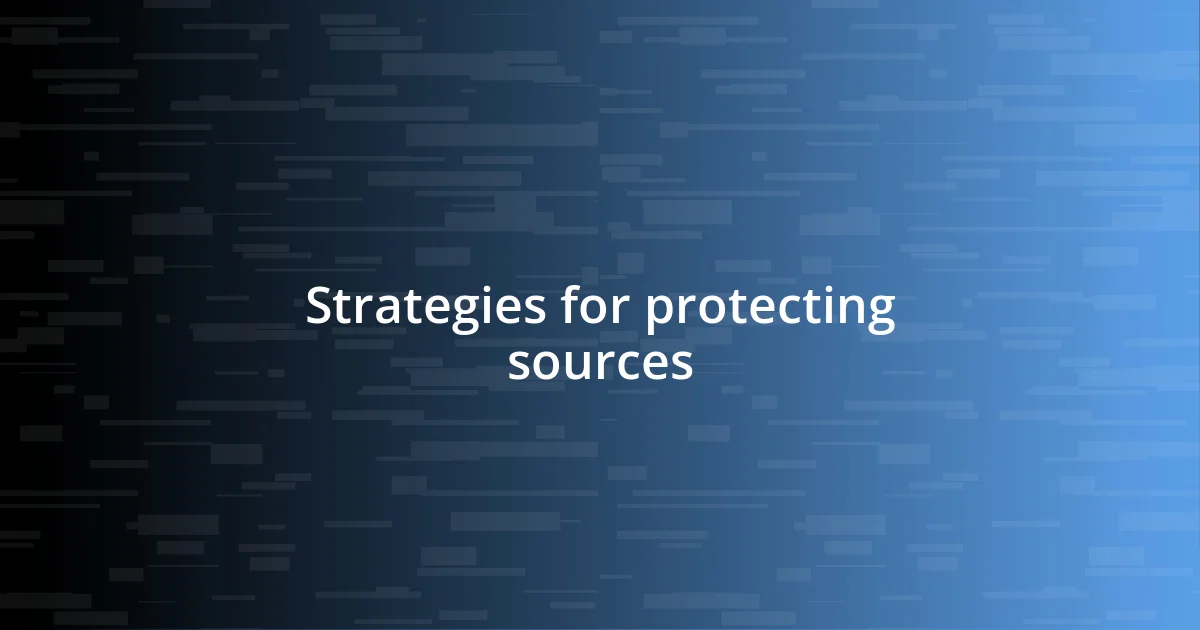
Strategies for protecting sources
When it comes to protecting sources, one of the most effective strategies I’ve found is using secure communication channels. Tools like encrypted messaging apps can be a lifesaver, especially in sensitive situations. I remember a time when a source expressed hesitation about sharing information over conventional phones due to the fear of being tracked. Switching to a secure app not only made them more comfortable but also reinforced the trust we were building. Isn’t it fascinating how technology can enable transparency while also ensuring privacy?
Another essential strategy lies in anonymity. While interviewing sources, I often assure them that their identities will be protected, sometimes by using pseudonyms or withholding their specific locations. I recall one particular interview where a whistleblower was hesitant to speak out about corruption in their company. By promising to keep their name and details confidential, they opened up about the most shocking practices without the fear of repercussions. It’s rewarding—and, honestly, quite humbling—to see the courage of individuals who trust us to safeguard their identities.
Finally, I’ve discovered the importance of vetting sources and understanding their motivations. This isn’t just about who they are; it’s about gauging their intentions and understanding the potential fallout of their revelations. In my experience, sitting down for a coffee and having an honest conversation can unearth layers of context. There was a time when I learned that a source had personal stakes in the story. Recognizing this helped me navigate my reporting accordingly, ensuring that I was diligent in balancing their need for privacy with the story’s public relevance. Don’t you think that this deeper understanding fosters a stronger relationship between a journalist and their source?
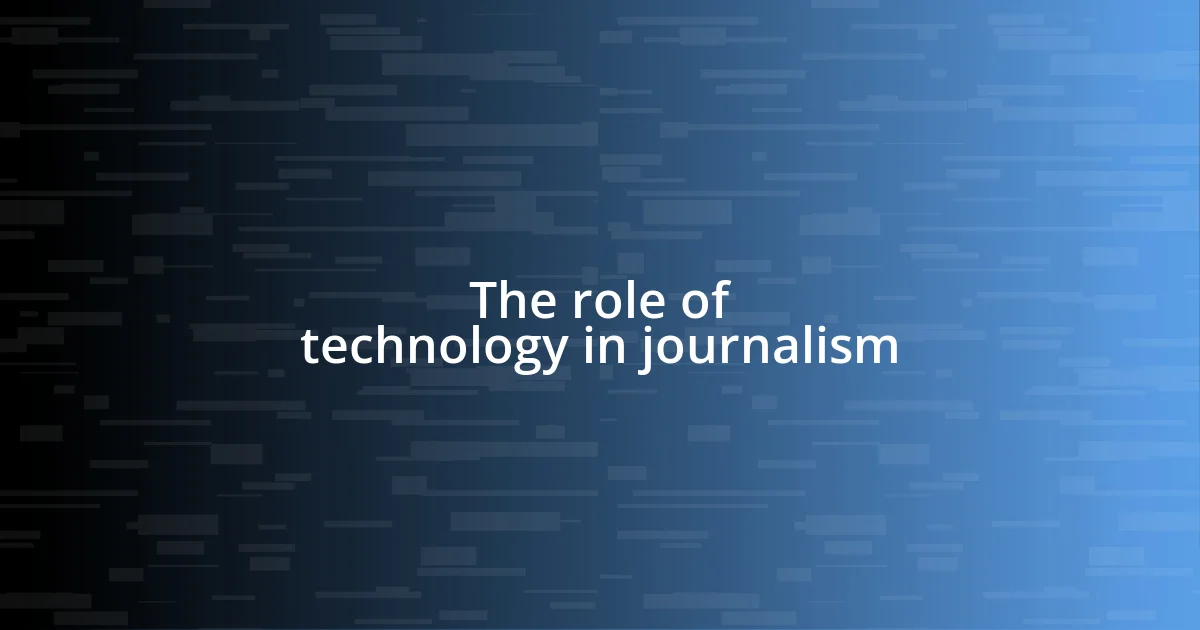
The role of technology in journalism
Technology plays an increasingly vital role in journalism today. With the advent of social media, I find that information spreads faster than ever, making it essential for journalists to verify facts before sharing them. There was a time when I observed a rumor circulating rapidly online. It was alarming to see how misinformation could lead to public outrage and harm innocent people. That experience made me realize that while technology offers unprecedented access to information, it also demands a more scrupulous approach.
Moreover, the tools available now for news gathering and reporting have transformed my work. I once used digital surveillance software to track public records for investigative pieces, which brought to light many crucial details I would have otherwise missed. It’s incredible how technology can unearth layers of a story, but it also raises ethical questions about privacy. When is it considered invasive? How do I balance my quest for truth with the potential harm it might cause to an individual’s privacy?
Finally, the advances in data journalism are reshaping how we tell stories. I remember collaborating with data analysts to visualize complex statistics for an article, which not only enriched the narrative but also made it more engaging for readers. This experience reinforced my belief that technology, when used responsibly, can enhance storytelling. However, it also makes me ponder: Are we relying too much on technology, perhaps forgetting the human element in journalism? Striking that balance remains crucial in my practice.
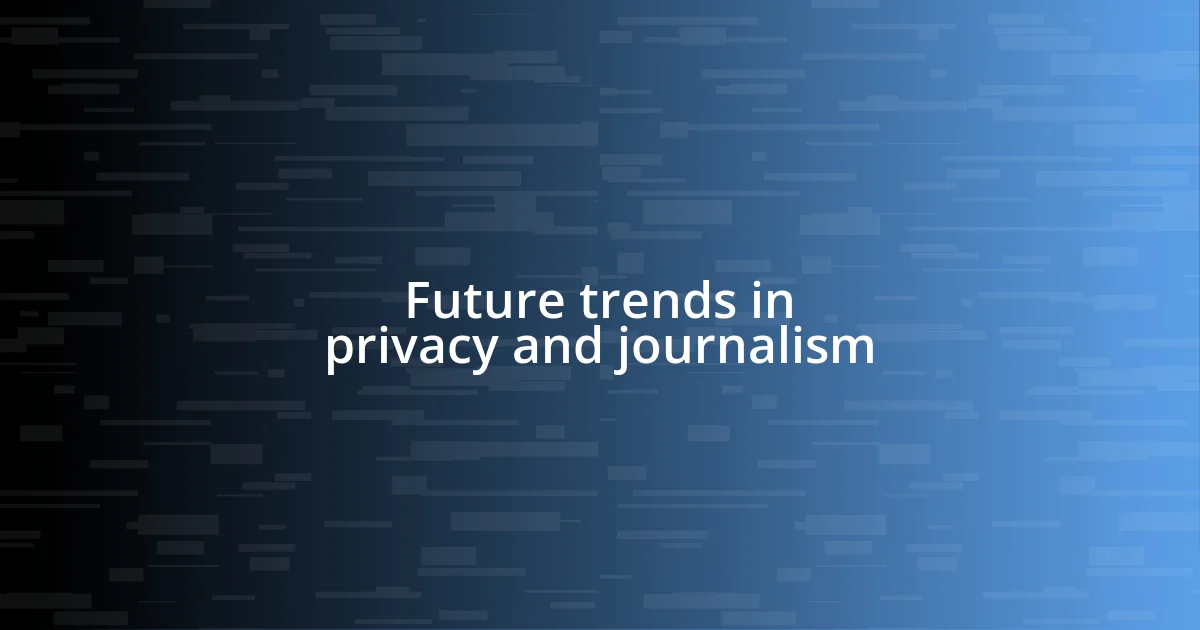
Future trends in privacy and journalism
As I look to the future of privacy in journalism, I’m struck by the rising importance of informed consent. Journalists are increasingly expected to explain how their stories might impact individuals and communities, especially in an era where revelations can go viral in an instant. I remember a situation where I was covering a sensitive topic, and I chose to have a candid conversation with my subjects beforehand. It was eye-opening to see how much more open they became when they understood the context of my questions. Don’t you think that this transparency can lay the groundwork for a more trustworthy relationship between journalists and the people we report on?
Another trend I foresee is the continuous evolution of legal protections for sources. I can’t help but feel optimistic about the discussions happening in various legal circles advocating for stronger shield laws. My experience has shown me that when sources have the legal backing to share information freely, it can lead to groundbreaking stories that bring vital issues to light. I once interviewed a journalist who bravely fought for a shield law case, and hearing their journey was inspiring. It made me think: how can our advocacy for stronger protections change the landscape of journalism for the better?
Lastly, the intersection of privacy technology and journalism will continue to grow. With tools designed to enhance online privacy, reporters can better protect their communications and sources. I once attended a workshop on digital security that introduced me to emerging technologies—like anonymizing services—that not only safeguard journalists but also enable more fearless reporting. I can’t help but wonder: as we embrace these advancements, will we also retain the essence of emotional storytelling that connects us with our audience?






